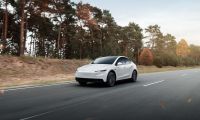The good news for Nissan Motors was that in September 2012, they managed to deliver more versions of their Leaf electric vehicle than they have in any other month this year. The bad news for Nissan was that the Chevrolet Volt also posted its best month of the year so the Leaf didn’t gain any ground on the American EV even in what proved to be a strong month for the Leaf.
In September 2012, General Motors sold 2,851 examples of the Chevrolet Volt to set a new monthly sales record for both itself and the electric vehicle segment in the US. The Volt beat its previous best sales month of August 2012 by just 20 units but in September 2012 GM sold more than 294% more Volts than they did for the same month in 2011 when they sold just 723 Volt electric vehicles. This new record best is more than a thousand units higher than any month in Volt sales with the exception of August and February 2012. In short, September 2012 was a very good month for the Volt.
On the year, General Motors has sold 16,348 copies of the Chevrolet Volt which accounts for a stunning increase of 320% over the number of Volts sold during the first 9 months of 2011. More importantly, with September being the 8th straight month where the Chevrolet Volt has badly beaten the Nissan Leaf in sales, the electric Chevy has sold more than three times as many units as Nissan has sold the electric Leaf – allowing the Volt to amass a lead of 11,136 units on the year. The Volt’s average monthly sales of 2,396 units has the GM’s revolutionary EV on route to sell just shy of 22,000 vehicles this year provided that we don’t see a sudden dip in EV sales.
The Nissan Leaf had its best month of 2012 in September, delivering 984 units to American buyers but that was still roughly 5% worse than the delivery figures recorded in September 2011. For the 2012 calendar year, Nissan has delivered 5,212 units in the US due to production constraints in Japan. GM has sold more Volts than that in the last two months.
If you wondered why I talk about how many Volts General Motors “sold” while I reference how many Leaf EVs Nissan “delivered”, that is because Nissan isnt actually selling the Leaf right now. During the 2010 calendar year, Nissan took a new and interesting approach to selling a vehicle – taking reservations that required just a small yet refundable deposit. Before Nissan could react, they had received 20,000 preorders for the Leaf and since then they have been working to deliver on all of those preorders. Because of that, the new Nissan Leaf EVs being delivered each month are not new orders but rather, these newly sold units are based on orders that were placed more than two years ago. Nissan plans to fix this problem by beginning production of the Leaf in the US later this year but that increased production capacity will come way too late to make any difference in the 2012 electric vehicle sales race.
This could be one of the key reasons that the Chevrolet Volt has so badly outsold the Nissan Leaf in almost every month in 2012 shy of January. Right now, a consumer who wants a new Chevrolet Volt can walk into almost any Chevrolet dealership in the country and if they cannot drive one off of the lot – they can place an order for a car that is soon to be built and delivered. On the other hand, a consumer who wants a Nissan Leaf can only go to a local dealership and put their name on a list to be contacted when ordering has started back up. Nissan plans to begin taking new orders soon but those consumers will still have to wait until the 2010 preorders are all filled.
If the annual sales battle between the Nissan Leaf and the Chevrolet Volt were a football game, the results of September 2012 would be the equivalent of the Volt throwing a 90 yard touchdown pass to extend an already insurmountable lead. Things haven’t been great for the Nissan Leaf in 2012 as consumers around the US have shown a strong preference for the Chevy Volt due in part to its gasoline powered range extending engine. Even though the Volt costs quite a bit more than the Leaf, sales numbers do not lie and the story told by the 2012 EV sales announces pretty clearly that the American automotive consumer is more interested in a vehicle that does not cause range anxiety.
Editor's Note - October 9th 2010: Click here for a look at why we decide to compare the sales figures of the Nissan Leaf and the Chevrolet Volt each month.
Set Torque News as Preferred Source on Google












Comments
You have to be kidding me.
Permalink
You have to be kidding me. Selling only 2000 units a month is a failure in the auto-biz unless your a liberal journalist. Is the journalist writing the story considering buying a Volt for purchase? I suspect not, and I am not either.
I love my Volt and laugh at
Permalink
In reply to You have to be kidding me. by LoFlyer (not verified)
I love my Volt and laugh at people like you everytime I drive past you at the gas station!
Thats because you have not
Permalink
In reply to You have to be kidding me. by LoFlyer (not verified)
Thats because you have not driven a volt or rode in one. For city driving i get 45 to 50 miles on single charge. I have not paid for gas for the volt in the 6 months of owning the car. If you drive one you will love the car. Smooth car, and fast.
Thats because you have not
Permalink
In reply to You have to be kidding me. by LoFlyer (not verified)
Thats because you have not driven a volt or rode in one. For city driving i get 45 to 50 miles on single charge. I have not paid for gas for the volt in the 6 months of owning the car. If you drive one you will love the car. Smooth car, and fast.
Since the Volt is the median
Permalink
In reply to You have to be kidding me. by LoFlyer (not verified)
Since the Volt is the median volume car sold in the US, you have defined half of all cars sold as "failures." Care to reevaluate?
Why do you continually
Permalink
Why do you continually compare the Volt to the Leaf. The Volt is a hybrid and the Leaf is all electric. The Volt sales should be compared to the Toyota Prius sales or any other Hybrid. The Leaf should be compared to the Tesla or Fisker. Or, I know, go out on a limb and compare the Volt to the new Tesla S.
I would ask if you have ever
Permalink
In reply to Why do you continually by Bluephrog (not verified)
I would ask if you have ever looked at the Volt drive train compared to the Prius or have driven a Volt. The Volt is nothing like a Prius in operation or driving characteristics. The Volt is an electric drive with a backup generator and the Prius is a gasoline drive with an electric assist. Unlike a Prius when you start out with a Volt you cannot create a power demand that engages the engine. You only get a gasoline engine running when you have exhausted the battery charge. The Volt will go 100 miles an hour on pure electricity. The Prius will only go a fraction of that speed. The Volt, like the Leaf, is first and foremost an electric drive and they drive very similarly, great power, quiet and smooth no shifting and no engagement of a different drive source. The real difference is the ability of the Volt to produce its own electricity and in very rare occasions after depleting the battery charge switch to different power train modes, and act a bit like a hybrid when running in "generator" mode. It will turn the engine off like a hybrid when stopped at a stop light and after about 25 mph or so restart the generator if necessary but does so seamlessly, unlike the hybrid drive Prius. If more people really understood the Volt they would see it as an electric drive with additions not simply dismiss it as just another hybrid. It is really a great piece of engineering.
"It is a really a great piece
Permalink
In reply to I would ask if you have ever by Own Both (not verified)
"It is a really a great piece of engineering". The lithium ion battery design, similar to what is used in the Chevy Volt, was first invented in 1912. The first Lithium batteries were offered for sale to the public in 1970. At this juncture, there are several unknowns with the Volt, life of batteries, disposal costs associated with spent lithium battery carcasses, maintenance costs associated with the internal combustion engine and reliable operation of this technology under adverse conditions (sub-freezing temperatures/extreme heat)?
Approaching 40K in cost, the Volt is not inexpensive transportation. With less than forty thousand of these vehicles being driven in selected markets, one cannot make the claim this vehicle will achieve universal acceptance throughout the country. I would surmise the Volt will be viewed as a "fad" automobile by a majority of our driving public for years to come. GM didn't help their cause with a disingenuous promotion of the Volt. Our Government, stealing from the stockholders, has left a bitter taste in my mouth. No more GM products in our garage.
While fair to hold a personal
Permalink
In reply to "It is a really a great piece by dixiedrifter (not verified)
While fair to hold a personal grudge about investor treatment, that has nothing to do with the engineering. Trying to go full electric at a time when the technology is not yet mature enough to produce a reliable long range product leaves the Volt in a position to be a very real alternative to gasoline first consumption autos.
Suggesting that battery technologies have been around for a long time and therefore are nothing new fails to recognize the engineering of control systems to manage the battery and power train to deliver the performance of the Volt. It is also selling the testing of extreme environmental conditions short as well. With an environmentally conditioned battery the Volt overcomes the limitations of weather extremes quite well.
It is also very unreasonable to expect the first edition of a vehicle to enter into the market as a price leader and be for everyone. One can also make the argument that the consumer is "pre-paying" part of their energy costs of operating the vehicle. This is precisely what my experience has shown me. By saving $175.00 per month over the cost of operating my previous gasoline powered car (real numbers by the way), by the end of a 5 year period, I will have saved over $10,000 that will essentially be used to either replace the battery or go toward purchasing another vehicle. The alternative is to hand the money over to Oil companies or OPEC.
As far as the ICE generator, there are oil changes only every 2 years under normal conditions, no tune-up ever, no timing belt to replace as it runs such a small amount of time compared to a standard drive train. The engine is also monitored by the control systems and given its use and mantainence schedule should be almost an afterthought. The maintenance schedule alone is vastly different from the standard gasoline car and the drive train, while not yet fully proven, has been remarkably trouble free in the field.
We as a country are far too dependent on foreign oil and must take steps to reduce that dependency to bolster our economy. That there is a first generation vehicle available that offers the best alternative out there is a concept that I am willing to spend money to support. To date my investment has returned 7000 blissful and comfortable miles of driving pleasure. My previous vehicle leaked fluids and sometimes had starting troubles needed oil changes, had far more service issues and delivered a less comfortable ride. When I added the costs of gasoline, even at a reasonable efficient 24 MPG city, I would take the Volt any day.
America's love affair with less efficient power trains needs to go into a steep decline. We sometimes fool ourselves into thinking that anything that is cheap to purchase at first is somehow better. Cars are no longer "cheap" they are very expensive and rethinking the engineering and how we use them is being redefined. Chevrolet, with the Volt, has pushed the envelope from the hybrid closer to a fully electric drive train that allows for the state of engineering technology to move forward closer to a full electric vehicle. It is fair to criticize the trade-offs but the future is clear. More vehicles will be electric in the future. Not all, but enought to make a difference.
You open with a criticism of
Permalink
In reply to Why do you continually by Bluephrog (not verified)
You open with a criticism of comparing the Volt (hybrid) with the Leaf (electric) and close by suggesting they compare the Volt (hybrid) with the Model S (electric)....
Yes, I said "go out on a
Permalink
In reply to You open with a criticism of by Rob (not verified)
Yes, I said "go out on a limb" and do the comparision. At least you are comparing a car (Tesla) without the range problem of the Leaf. To me it has the same apples to orange comparsion though.
Hello! First, thanks to all
Permalink
In reply to Why do you continually by Bluephrog (not verified)
Hello!
First, thanks to all for commenting.
Second, to answer your question, I put together a piece looking at why I compare the Leaf and the Volt each month. There is a link to this new piece at the very end of the article above.
As an "owner" of both a Volt
Permalink
As an "owner" of both a Volt and a Leaf, my experience does not reflect the content of the article. The Chevrolet Volt that I purchased was not in stock at the dealers and I had to wait for delivery. There were precious few to choose from. Because of the financing I chose the purchase option. My experience with the vehicle showed me the reality of electric drive cars and how they offer great performance. It was the tremendous discounts on the Leaf lease program that lead me to take advantage of what I would call a "no-brainer" lease. For $116 a month I am able to have my wife drive a brand new nicely equipped Leaf and I chose from 7 vehicles on the lot and took delivery with hours of first visiting the dealer. While the Leaf is a nice vehicle, it is extremely limited and makes you think about every trip if you have enough charge to reach your destination. It is an errand and commuter vehicle that requires extreme planning compared to the extended range Volt. The Volt offers all the advantages of a versatile electric drive train and none of the range anxiety. I would lease a Leaf but put my money on the Volt. They are very nice vehicles and have exceeded my expectations. I love driving them.
I think you prove my point.
Permalink
In reply to As an "owner" of both a Volt by Own Both (not verified)
I think you prove my point. Comparing true electrics is not comparing a Volt to a Leaf. Your statement about range anxiety is exactly why. I feel that if you have a alternate energy source powered by a different fuel (hybrid?) against a single fuel you are not comparing apples to apples. I think the Volt is a great car and so is the Fisker and Tesla. I'm just saying that comapring the Volt to the Leaf, especially sales figures, is comparing apples to oranges. Comparing hybrids whether total electric drive or not is comparing similar range extending capability which most non-technical people are doing. Most people have no idea what is actually happening in the drive train.
Good response. My problem is
Permalink
In reply to I think you prove my point. by Anonymous (not verified)
Good response. My problem is that there is a tendency to group the Volt with hybrids since there is no drive train like the Volt. The result is it gets classified as a hybrid because of its generator fuel, not its drive train technology. Your point is well taken that "pure" electrics are yet again another classification and not directly comparable to the Volt.
The driving experience of the Volt is remarkably similar to the Leaf and other electrics however; and not at all like hybrids. I think of the Volt more as an electric drive and last month my electric usage was 97% of total miles driven. (Pretty non-hybrid to me.) However one could simply run the Volt like a hybrid and never plug it in and it would more closely approximate the performance of a hybrid vehicle. The Volt simply does not have any other drive train that acts like it does. In the real world, it seems like a more ideal alternative that offers the best of fuel and range choices and when people come to understand how it works there will be greater acceptance of its versatility. We Volt owners see that and that is part of the reason for such high owner satisfaction ratings. It has exceeded my expectations in every way since I took delivery of it in June.